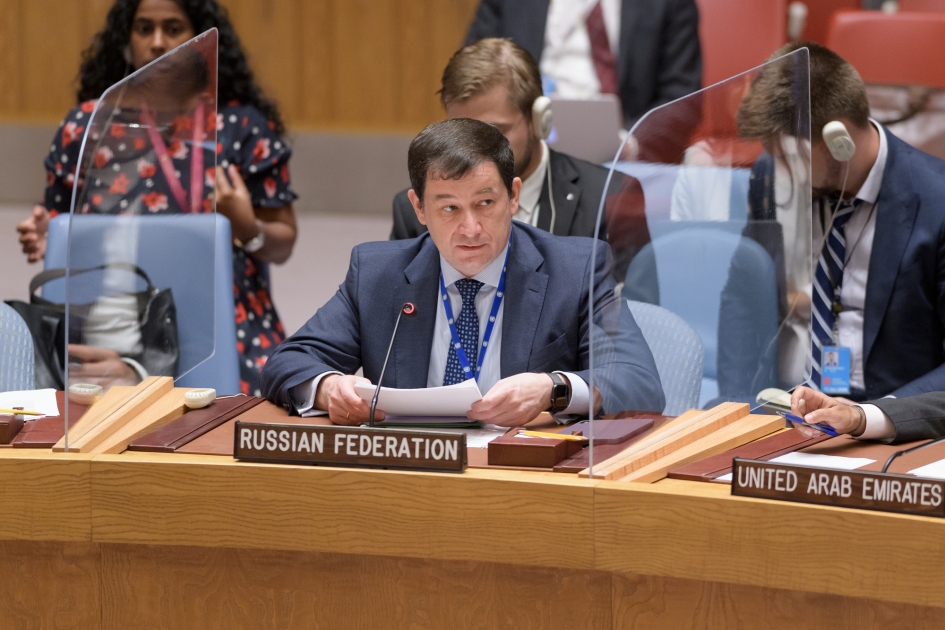Statement by Chargé d'Affaires of the Russian Federation Dmitry Polyanskiy at UNSC briefing on the situation in Libya
Mr.President,
We thank Assistant Secretary-General M.Pobee for the briefing.
We closely follow the developments in Libya. The inability to reach an agreement on the draft constitution and convene nation-wide elections within the term, set out in the roadmap of the Libyan Political Dialogue Forum have led the country to a state of political uncertainty. Then security situation started to deteriorate, which triggered recent protests and armed clashes. The situation is further exacerbated by the lack of solution to the issue of unification of economic and financial institutions, as well as the overall degradation of the living standards.
We call on all participants of the political process to maintain peace and keep from any acts that infringe on it. In the current conditions, incitement to violence and making use of protests in one’s own political interests are unacceptable. Inviolability of civilian population, state and private property must be strictly upheld.
At this stage, the most important thing is to level out contradictions among Libyan political forces and help them find some common ground, based on which they can move forth towards unification of the country in the spirit of 2020 Ceasefire Agreement and UNSC resolution 2570. We assume that national reconciliation process in Libya should be inclusive and transparent. This implies involvement of all leading political forces of the country, including representatives of former Jamahiriya. In this regard, we welcome efforts of the African Union and personal efforts of the Chair of African Union High-Level Committee on Libya, President Denis Sassou Nguesso of the Republic of Congo. We support the idea of the African Union to convene a Libya-wide conference on reconciliation. For its part, Russia will render all possible assistance to facilitate implementation of this initiative.
Mr.President,
We welcome continuous efforts of Libya’s House of Representatives and Supreme Council of State that keep seeking a consensus. The sides have accomplished a great deal of work, so it is especially sad that the solution has not been achieved yet. Progress at the constitutional track is the key to ensuring control of Libya’s institutional sovereignty and a guarantee of its territorial integrity.
Libyan stakeholders realize that a relapse into armed confrontation would be very dangerous, and therefore they try to preclude such a scenario. We note the symbolic importance of the meeting of 5+5 Joint Military Commission in Tripoli, which is a milestone development in terms of unification of Libyan armed forces. No less important are the agreements regarding synchronized, well-balanced, gradual, and step-by-step withdrawal of all non-Libyan armed groups and military formations from Libya.
We realize the importance of stable oil production in Libya. Thereby we underscore that proceeds from the sale of hydrocarbons should help improve the living standards in Libya, pay salaries to civil servants, ensure unimpeded energy supply. However, excessive hastiness but rarely yields positive results. This work must be carried out in a thoughtful and well-weighed manner, with due account for possible long-term implications for the country. There must be no impetuous steps.
In this connection, we could not fail to notice with what eagerness our Western (first of all American) colleagues advocate for “prompt resumption” of operations at Libya’s major oilfields. Taking into account the overall tension at world’s energy markets and volatility of oil prices, these calls may be interpreted as approval of attempts to sidetrack pressing tasks of Libyan political settlement for the sake of their own selfish interests. Actually, that’s what they do in other parts of the world as well.
Mr.President,
Libya is nearing a turning point of its history. The future of the country will depend on how quickly the sides reach a common ground. External actors need to consolidate their approaches in order to lead Libya out of its crisis, keep all protagonists in the political orbit, and prevent further escalation.
Russia joins the international consensus, according to which the UN holds the central role in issues of Libyan settlement. We reiterate our strong support for the key element of this configuration – UN Support Mission in Libya (UNSMIL), whose mandate expires at the end of this week. Unfortunately, UNSMIL has been operating in the absence of a Head of the Mission for the past six months, which seriously affects its capabilities.
We are convinced that the UN emissary must hold a UNSC-authorized mandate. Only in this case will he or she have all instruments that are required to support the national dialogue in Libya, and only then will Libyans be able to truly trust him or her. By the way, we cannot rule out that the current political deadlock in Libya may have been caused by the absence of such person.
We see that the Secretary-General is strongly committed to resolving the issue of his Special Representative. Nevertheless, we call on him to bolster the search for a candidate while approaching the issue in a thoughtful and realistic manner. We assume that the candidate must be acceptable for the Libyans and regional stakeholders, and also have approval of the Security Council. We believe in this situation a technical rollover of UNSMIL mandate for three months will be the best solution. This will give the Secretariat the much-needed time. And then, when the new SRSG is finally appointed, we will be able to talk about further steps, including adoption of a substantive resolution.
Thank you.
